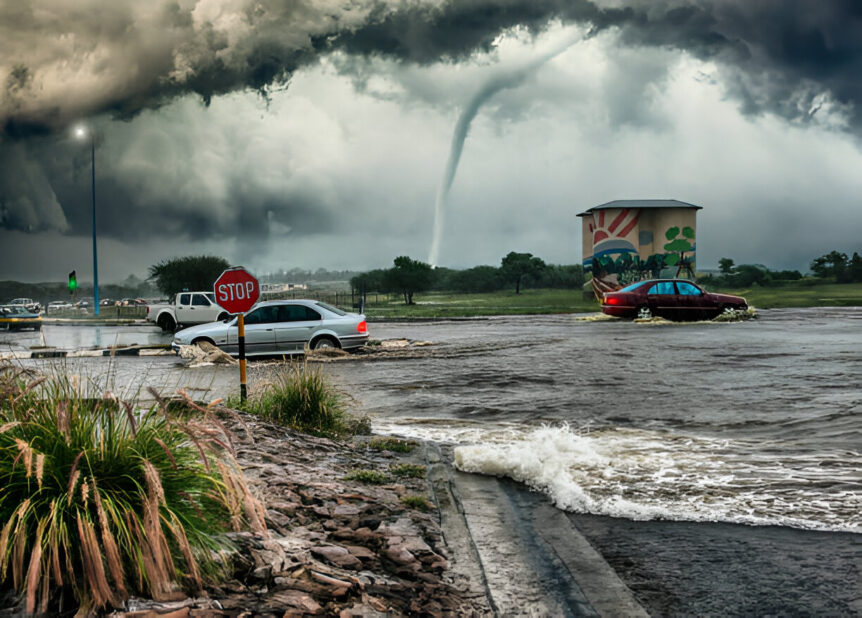With Hurricane Milton being one of the fastest-growing hurricanes since Wilma in 2005, the need for preparedness was never more urgent. This Category 3 storm slammed Florida’s Gulf Coast with torrential rain and 120 mph winds, submerging and devastating whole neighborhoods. Tragically, 24 lives were lost, and entire communities were left grappling with the aftermath. As rescue teams pulled residents from flooded homes and assisted living facilities, the satellite images of flooded homes near Siesta Key and Tampa were a stark reminder: hurricanes are unpredictable and dangerous. The good news is that hurricane preparedness can significantly increase your family’s safety during such events. Taking the right precautions and knowing what steps to take before, during, and after the storm can save lives and protect property. Below is a hurricane preparedness checklist to help you get ready for future storms like Hurricane Milton. Keep your family safe by starting your preparations now!
What is the Latest Update on Hurricane Milton?
As Hurricane Milton made landfall near Siesta Key on October 9, 2024, it became one of the most damaging storms to hit Florida’s Gulf Coast in recent years. Residents in the Tampa area saw their homes submerged, with floodwaters creeping into neighborhoods and rising at alarming speeds. Hillsborough County reported dozens of rescues, including more than 135 elderly residents who had to be evacuated from an assisted living facility. With winds clocking in at over 120 mph, Hurricane Milton tore through homes, uprooted trees, and caused widespread flooding.
The aftermath of Milton shows us just how critical it is to be prepared for hurricanes. So, what can you do now to protect your family and property for the future? And what should residents do now if their homes sustained damage from Milton or Helene?
Steps Property Owners Should Take After Hurricane Milton
If you were on Hurricane Milton’s path, the days and weeks following the storm are critical for recovery. These steps will guide you through the process.
-
Assess and Document Damage
After a nstorm passes, the first thing you should do is assess the damage to your property. Take photographs and videos of any damage inside and outside your home. This documentation will be vital for your insurance claim. Remember to include everything—roof damage, broken windows, water intrusion, or damaged personal items.
-
File an Insurance Claim Promptly
The faster you file your insurance claim, the sooner the recovery process can begin. Contact your insurance company as quickly as possible to start the claims process. Be ready with your policy information and the documentation of your property damage.
More: Home Insurance Company Offering Low Settlement? Here’s What to Do
-
Secure Temporary Repairs
While you wait for your insurance company to process your claim, make temporary repairs to prevent further damage. For example, covering broken windows with plywood or tarping a damaged roof can prevent water damage from worsening. Keep all receipts from these temporary repairs, as your insurance company may reimburse you.
-
Understand Your Rights and Options if Your Insurance Claim is Denied
Unfortunately, insurance companies don’t always pay out claims fairly. If your claim is denied or underpaid, don’t hesitate to seek help. You have rights as a policyholder, and a legal professional can help you challenge an unfair decision. Knowing your options and standing firm can significantly impact your recovery process.
5 Steps to Prepare for the Next Hurricane
Hurricane Milton has shown us how unpredictable and dangerous storms can be. Now is the time to plan for the next one. Use this hurricane preparedness checklist to ensure you’re ready.
-
Prepare a “Go Bag” for Each Family Member
Each family member should have their own “Go Bag” filled with essential items they’ll need if you need to evacuate quickly. Items should include:
- Identification documents
- Prescription medications
- Extra clothing
- Non-perishable snacks
- Bottled water
- A flashlight with extra batteries
- A first-aid kit
- Important family contact information
Ensure the bag is easy to grab and go in case of an emergency evacuation.
-
Create an Emergency Family Communication Plan
Cell towers might be down during a storm, and communication could be difficult. Make sure your family has a communication plan in place. This plan should include:
- A designated meeting place if you’re separated
- Emergency contact numbers written down (in case phones fail)
- A trusted out-of-town contact who can coordinate between family members if local lines are down
This plan ensures everyone knows how to stay in touch, even when typical communication methods aren’t working.
-
Secure Your Home
Before the storm hits, secure your home to minimize damage. Some steps you can take include:
- Installing storm shutters or boarding up windows
- Reinforcing garage doors
- Securing outdoor furniture or other items that could become dangerous projectiles
- Trimming trees and securing loose branches
- Checking that your roof and gutters are secure and free of debris
These steps can help protect your home from high winds and flying debris.
-
Stock Up on Water and Non-Perishable Food for 7 Days
Having enough water and food for your family is critical during a hurricane. Plan for at least one gallon of water per person daily for at least seven days. Stock up on non-perishable food like canned goods, protein bars, and peanut butter. Don’t forget a manual can opener!
-
Establish a Family Evacuation Plan
If an evacuation order is given, you need to act fast. Establish a family evacuation plan to know exactly what to do if you need to leave your home. Your plan should include:
- A mapped route to the nearest evacuation shelter
- Arrangements for pets (many shelters don’t accept pets, so plan accordingly)
- A full tank of gas in your vehicle before the storm arrives
This plan reduces panic and confusion when an evacuation becomes necessary.
More: Hurricane Preparedness for Pets: 5 Things to Do Before the Next Storm
Stay Prepared and Keep Your Family Safe — Start Planning Now
In reality, hurricanes like Milton can strike with little warning, and their impact can be catastrophic. However, being prepared can make all the difference. Following this hurricane preparedness checklist, you can take the necessary steps to protect your family, home, and peace of mind. Don’t wait for the next storm to be on the horizon. Start your preparations today!
At RRBH Law, we’re here to help you through the aftermath of hurricanes and other natural disasters. If you need assistance with an insurance claim or your claim has been denied, our experienced attorneys are ready to fight for you. Since 2015, we’ve been dedicated to helping families in Florida recover from disaster and get the compensation they deserve.
Contact us at 305-800-4663 to schedule a consultation and ensure you’re fully prepared for whatever the next hurricane season may bring. Stay safe, and start planning today!

